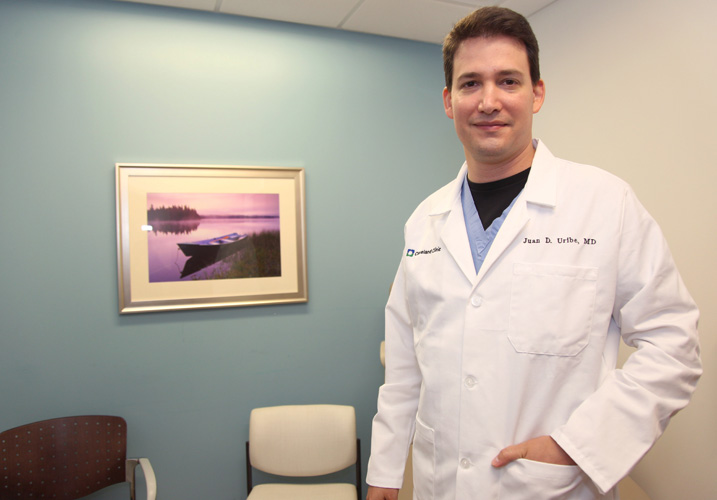‘Deep brain stimulation’ or DBS is every bit as complex a procedure as its name implies.
But Cleveland Clinic Indian River Hospital has now added another neurosurgeon, Dr. Juan Uribe Villa, who is more than up to the task of performing these intricate operations.
Oddly enough, DBS is often deemed to be “minimally invasive.”
As the National Institute of Neurological Disorders and Stroke explains, “DBS is a surgical procedure used to treat several disabling neurological symptoms – most commonly the debilitating motor symptoms of Parkinson’s disease, such as tremor, rigidity, stiffness, slowed movement and walking problems” – as well as dystonia (a movement disorder in which the patients’ muscles contract involuntarily causing repetitive or twisting movements) and some types of epilepsy.
Now, for many – if not most of us – the term “minimally invasive” for any type of brain surgery sounds like an oxymoron.
Uribe Villa understands the confusion.
“It is considered minimally invasive,” says Uribe Villa, “because of the [small] size of the incisions that we need to make and how little exposure of the brain we require.
“The largest incision is a C-shaped incision that measures approximately an inch in diameter and access to the brain is created via a small bur hole on the cranium which measures half an inch in diameter,” Uribe Villa explains. “That is why it is considered a minimally invasive procedure. But I would have to agree that this is an implant that will be placed deep in your brain” which doesn’t seem so “minimal.”
At the same time, he says, “risks are minimal when it comes to this surgery. Whenever we cut the skin there is always going to be a risk of infection, especially when we are placing an implant [but] we take the necessary precautions to prevent this from happening.”
DBS procedures implant electrodes in targeted areas of the brain that deliver electrical impulses that can regulate or cancel-out naturally occurring abnormal brain impulses that control muscles throughout the body.
The amount of stimulation these electrodes deliver is controlled by a pacemaker-like device placed under the skin in the patients’ upper chest. A wire travels under the skin and connects this device to the electrodes placed inside the specific areas of the brain that control movement.
The Mayo Clinic says DBS “has been shown to be an effective treatment for movement disorders, including Parkinson’s disease, essential tremor and dystonia,” and adds, “more recently, DBS has emerged as a treatment option for Tourette syndrome.
“DBS is not a cure for these movement disorders, and the results of treatment aren’t always perfect, [but] many patients have excellent results and for some, DBS can be life-changing.”
Uribe Villa agrees.
“The best examples are movement disorder patients,” he says. “These are patients that depend on others for basic activities. Think about this: Basic life activities that we perform every day, that we take for granted and normally do not even think about, are really difficult to perform for these patients.
“Imagine trying to eat, dress yourself, brush your teeth, comb your hair, apply makeup or even use a screwdriver with a terrible tremor. It is extremely rewarding for me to see those patients that gain complete tremor control and regain their independence after DBS.”
Pausing briefly, he adds, “a great example of this was when we treated a young patient involved with the military. A big guy. During the procedure, when he saw his hands stop shaking, he started crying and sobbing uncontrollably due to pure happiness and disbelief. You do not see that every day!
“It’s also extremely effective in controlling tremor in essential tremor. We can expect up to 90 percent tremor control in these patients.
“Parkinson’s disease is a more complex condition and therefore the response to DBS is different, but overall, it greatly improves tremor, stiffness and the speed of movements in patients with Parkinson’s disease. So overall the quality of life is significantly improved.”
That said, Uribe Villa points out that “every patient will undergo a neuropsychiatric evaluation to determine if there is a psychological [or] psychiatric condition that needs to be addressed prior to considering the patient for surgery,” and that a team of physicians will determine if DBS is appropriate for each individual patient.
Medicare covers the DBS procedure.
Dr. Juan Uribe Villa is a neurosurgeon with the Cleveland Clinic Indian River Hospital. His office is at 3450 11th Court, Suite 305. The phone number is 772-563-4741.

